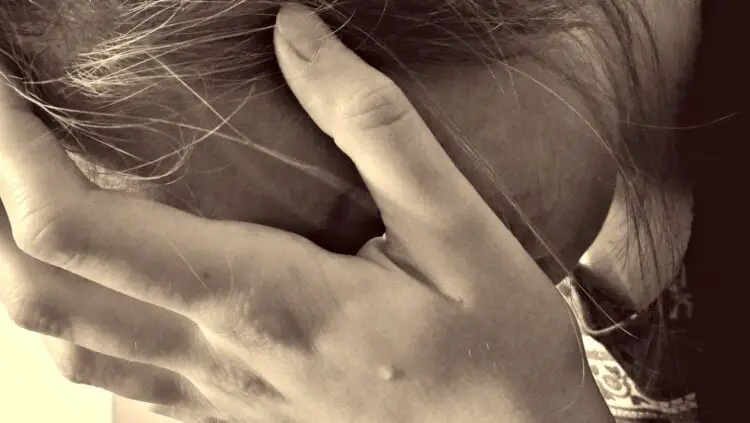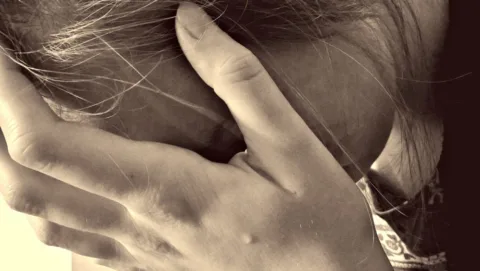Everyone will grieve for a loss at one time or another. Dealing with grief is a human experience that comes with being, well — human.
The grieving process requires you to work through your own physical, mental, and emotional reactions to the death of an important person in your life.
Grief isn’t reserved solely for death, either. You might not realize that many life-altering events (even some that are for the better) will require dealing with grief.
Divorce, job loss, an unexpected move, illness, loss of a beloved pet, etc. — can cause you to enter into what’s been called “the grieving process”.
Take it from me, I’ve grieved all of the above mentioned situations (and then some). Even though divorce was the best for me in the end — I still had to grieve the loss of the family unit.
I’ve learned that dealing with grief is the answer.
Rushing through it and not really feeling your feelings isn’t healthy. I’m sure you’re asking how do I get through this, right?
I’m going to walk you through the grieving process, offer suggestions to help dealing with grief, and share some thoughts about what you can expect to gain in the end.
It would be so ‘right-up-my-alley’ if there was a prescription for how to deal with grief. Like when it starts, how bad it is, and when it’s going to end.
Wouldn’t that be helpful? Unfortunately, there’s no quick fix for grief. It’s a part of the human experience.
The good news is it doesn’t last forever.
What Is Grief?
It’s often been noted that there are 5 stages of grief but of course every individual experiences it differently.
You might’ve learned how to cope with grief early in life when you lost a family member or treasured pet. Or you might not have had the opportunity to learn how to grieve.
Either way, since you’ll undoubtedly experience grief at some point in your life, it’s wise to be prepared ahead of time — so you’ll know how to deal with your feelings if and when the time arrives.
Grief can best be described as a process of letting go, as well as redefinition. Redefining your life without whatever (or whomever) it is you’re grieving.
Grief is often accompanied by a roller coaster of emotions:
- You’ll likely start with sorrow and move into anger.
- Then you’ll examine some regrets you might have and into fear of how you’ll get through it.
- Then you might hit the lowest point and feel despair — and then gain a little hope to pick yourself back up.
Blame and guilt can also be a part of the emotional chaos. My best advice is to go through all of it.
Try to re-direct your negative energy to other actions. Grief can also involve a flood of memories and mental images at any given time.
It can be an exhausting process to “re-live” these moments in order to re-interpret and store them away.
Allow yourself the time and energy to do it, without attempting to hurry through the process.
Here’s a great example of a mom giving herself permission to grieve.
What Does Grief Look Like?
There is no right or wrong way to grieve. The “5 stages of grief” theory may oversimplify what can be an uneven and lengthy process.
You’ll grieve at your own rate and in your own way. The more important and closer to you the deceased was, or the more tragic the loss is to you — the more complex the grieving process will be.
Remember that in the early stages of the grieving process:
- Denial is normal — especially when a loss is sudden.
- Denial itself serves an important, protective function and is your mind’s way of protecting you from more pain.
- It’s normal to not “fully get” that a loved one is gone (you might even still “feel” them near you).
Don’t let anyone make you feel like you shouldn’t feel what you feel.
How many of us have heard “well at least you knew they were dying”, or “they’re in a better place”? Although well-meaning friends say these things to make us “feel better” — those comments can make us second guess our feelings.
Untimely deaths such as the death of children, sudden accidents and crime deaths can trigger intense disbelief and anger, as well as longer periods of denial and depression in some cases.
Here’s some more information on what you can expect to feel in the denial stage.
Are There Physical Symptoms Of Grief?
Yes! Dealing with grief doesn’t just affect your emotional state. Many times it will also affect you physically.
It’s particularly important for those who are grieving to nourish themselves well, even though they may not feel like eating.
Some common physical symptoms you can expect when dealing with grief:
- Tightness of the throat — it might even feel as if you’re choking.
- Heaviness in the chest making it hard to catch your breath.
- An empty feeling in the stomach which may lead to a diminished appetite.
- Loss of strength or energy (these are also outward signs of depression).
- A variety of aches and pains that often have no physical cause.
Getting sufficient rest, forcing yourself to exercise, and avoiding alcohol and drugs can all help you to work through the grieving process more effectively.
Here are some signs and symptoms that you might want professional help to deal with your grief.
How Do I Process The Loss?
In order to go through the process of grieving, people must first acknowledge the finality of death.
Accepting the finality of never seeing the person again is hard to process. You may expect to see the deceased person come through the front door as they always did.
Don’t forget, death isn’t the only cause of grief. Until I got divorced I never realized how hard it would be to pick up the pieces and move on with my life.
Only then did I fully understand how that life-altering event affected not only us and our children, but our extended families, the way we spent holidays, vacations, and anything else we used to attend as a family.
Some suggestions for how to cope with grief and the finality of death:
- Be open to seeing reminders about your loved one, even if the experience is painful it will help you move through the stages of grief.
- Don’t pretend that things are fine when they’re not.
- Consider joining an online or in-person grief and loss group.
- Realize again that there’s no specific time frame for grief to end.
Cultural and family rituals can be helpful in the mental and emotional acceptance of separation.
After you move through anger and denial, you’ll begin to process the grief in the ways that feel most comfortable to you.
Here are over 100 online resources for finding grief and loss support.
What Can I Do To Heal?
Along with the pain of separation is the practical reality of it. Being on your own after many years with someone can be a gut-wrenching experience.
Many people find themselves exhausted at the end of the day, simply from coping with practical details. Grief counselors advise being kind to yourself and don’t try to overdo it.
When you’re in the throes of intense emotion, your instinct may be to isolate yourself alone in your bedroom – or it may be to surround yourself with people for distraction.
There’s no right or wrong process, but there’s one activity that seems to offer benefit for every grieving person who tries it, and that’s getting active.
Here are some physical things you can do to when dealing with grief:
- Declutter your home and give yourself space to breathe.
- Consider donating clothing to a thrift or consignment store.
- Rearrange the furniture in your living room and bedroom.
- Add light to the dark areas of your house — DIY lighting projects are a beautiful way to lighten up a home.
- Foster a dog or adopt a cat — they can be great companions!
- Think about sharing your home with a housemate or tenant.
- Play uplifting music that makes you feel happy.
Get help with some tasks or leave others for another day. Understand that you’re not at your best while you’re grieving. You must pace yourself as the process evolves.
Here are some excellent activities to help with your grief.
Should I Create A Memorial?
You might really enjoy finding a way to memorialize your loved one is a good way of working through the grieving process.
You can donate to your local church in the deceased’s memory. You can give to charitable causes that were important to the deceased.
Here are some other ways to memorialize them:
- Create a garden in their honor.
- Distribute the ashes in a non-traditional way.
- Commission a piece of art.
- Lighting a figurative memorial candle online.
- Create a keepsake box, jar, or something else that holds memories
Even simple things like lighting a candle in memory of a loved one can help to memorialize them in your mind and in your heart.
Creating a memorial or rituals to honor your loved one can ease the grieving process.
Here are some great ritual ideas to honor your loved one.
When Is It Ok To Move On?
Toward the end of the grieving period, you’ll likely find yourself in the final processing stage of loss and eventual acceptance. Again, this is also true when you are grieving other things like divorce, the end of a relationship, loss of a job, and other life-altering events.
You deserve to move on with your life (when you’re ready). It’s a time of new beginnings and a new “normal”. In many cases, it can involve a new dedication to worthy causes or work.
In other cases, the re-writing is an opportunity to explore part of the personality that may have been dormant when in the relationship with the deceased.
Here a few other ways to move through the grieving process:
- Many churches and social service agencies conduct grief support groups that can help people to work through the complex process of letting go of their loved one and moving on with their lives.
- Many people find it helpful to have a safe place to air their grief and to be with others who are experiencing the same feelings. Divorce Care is a nationwide organization that even offer support that includes how to financially recover from this loss.
- Actively work to remember the happy times and rewarding moments with the deceased or an ex.
Whatever the outcome, this re-writing of the personal story serves to ease the grieving person into a new life.
Here’s how one woman moved on after the tragic loss of her husband.

Grief can’t be hurried — and it can’t be dismissed. Dealing with grief requires time and self-care in order to reach the ultimate goal of acceptance and self-reliance.
More About How To Cope With Grief
In addition to the links I’ve included above, here are some other sites to help you understand how to cope with grief:
- What It Means To Love After Loss
- 7 Tips For Creating A New Life After Moving To A New City
- How To Prepare For The Death Of A Family Pet
I’m a health nut, a frugal mom, a dog lover, a DIYer, and a gadget girl. Personally, as a post-divorce, working single mom on a budget I have a lot of experiences that I enjoy sharing so others can learn from the things I wish I knew earlier! Professionally, I’ve worked full-time in a variety of marketing, sales, and editing jobs. You can always find me at the corner of Good News & Fun Times as Managing Editor at The Fun Times Guide (32 fun & helpful websites).








